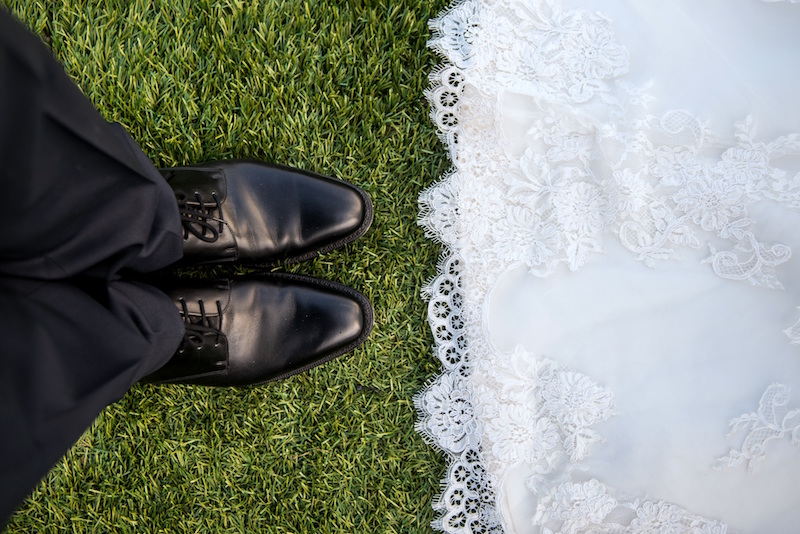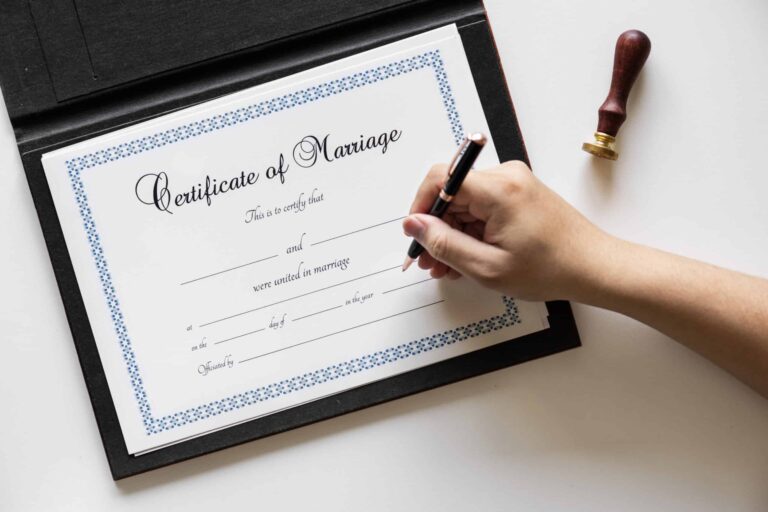A pastor or officiant generally cannot legally marry a couple without a valid marriage license. A marriage license is a government-issued document that authorizes a marriage. To get married legally, you must obtain a marriage license, meet eligibility criteria, and follow local procedures.
After obtaining the license, an officiant, such as a pastor, can perform the ceremony and make the marriage legally binding. Failing to obtain a marriage license can result in the marriage being considered invalid under the law.
How does a marriage license work?
A marriage license is a legal document issued by a government authority, typically at the county or city level, granting permission for two individuals to marry. It serves as a formal authorization for the marriage to take place.
Furthermore, the primary purpose of a marriage license is to ensure that couples meet certain legal requirements before entering into a marital contract. It is a way for the government to regulate and record marriages within its jurisdiction.
While a marriage license doesn’t make a marriage legal by itself, it is a crucial prerequisite for establishing the legal validity of a marriage.
Legal Significance of a Marriage License:
The legal significance of a marriage license lies in its role as evidence of a valid marriage. When a couple applies for and receives a marriage license, they are essentially declaring their intent to marry.
Once the marriage ceremony is conducted and the license is signed by the couple and their officiant, it becomes a legally binding contract, certifying that the marriage complies with the laws of the jurisdiction.
Additionally, the marriage license is a key document that allows the government to track and record marriages for various legal and statistical purposes, such as taxation, inheritance, and divorce proceedings.
What are the requirements for getting a marriage license?

The application process for a marriage license typically involves visiting the local government office responsible for issuing marriage licenses. This office is often found in the county clerk’s or registrar’s office.
Moreover, couples must complete an application form, providing personal information, such as names, addresses, birthdates, and sometimes social security numbers.
In some cases, both parties must appear in person to apply for the license, while in others, one person can apply on behalf of the couple.
Eligibility Criteria:
Marriage license eligibility criteria can vary by jurisdiction, but common requirements include being of a minimum age (usually 18 or older) and not being closely related by blood.
However, some jurisdictions may require proof of previous divorces or the death of a previous spouse if applicable. Certain states and countries have residency requirements, meaning you may need to live in the jurisdiction for a certain period before applying.
Required Documentation:
To obtain a marriage license, couples often need to provide identification, such as a driver’s license or passport, as well as proof of age and citizenship.
Moreover, if one or both parties were previously married, divorce decrees or death certificates may be required as documentation.
Fees and Waiting Periods:
There is typically a fee associated with obtaining a marriage license, which varies by jurisdiction. In addition, some areas may have a waiting period between applying for the license and when it becomes valid, usually to allow time for public objections or legal reviews.
Variations by Jurisdiction:
Marriage license requirements can vary significantly from one jurisdiction to another. What’s acceptable in one county or country may not be in another.
Moreover, it’s crucial for couples to research and understand the specific requirements and procedures in their chosen location to ensure a smooth process.
How can a pastor become an officiant?
The rules regarding who can officiate a wedding vary by jurisdiction. In many places, ordained ministers, priests, rabbis, judges, justices of the peace, and other religious or civil officiants are authorized to perform weddings.
Moreover, some jurisdictions may allow friends or family members to become officiants for a day by obtaining a temporary officiant status or a one-time permission.
The Role of a Pastor as an Officiant:
Pastors, ministers, and clergy members often serve as officiants in religious wedding ceremonies. Their role extends beyond simply conducting the ceremony.
Additionally, they may provide premarital counseling, assist with writing personalized vows, and help the couple navigate the religious aspects of their union.
Furthermore, the extent of their involvement can vary depending on the couple’s preferences and the religious traditions involved.
Legal Responsibilities of the Officiant:
Officiants have legal responsibilities when performing weddings. One of the primary responsibilities is to ensure that the ceremony complies with the laws of the jurisdiction. In addition, they must verify that the couple has obtained a valid marriage license before conducting the ceremony.
After the ceremony, the officiant and witnesses (if required by law) must sign the marriage license to validate the marriage legally.
Conducting the Marriage Ceremony:
Officiants have flexibility in conducting marriage ceremonies, and the style and content of the ceremony can vary widely. Moreover, they often lead the exchange of vows and rings, pronounce the couple as legally married, and sign the marriage license.
The content of the ceremony can be customized to align with the couple’s beliefs, whether religious or secular.
What happens if you marry without a license?

Marrying without a valid marriage license typically renders the marriage invalid in the eyes of the law. Furthermore, this means that the couple’s union is not legally recognized, and they may not enjoy the legal rights and benefits associated with marriage.
Couples who marry without a license may face various legal challenges. For instance, they may encounter difficulties with property rights, inheritance, and access to healthcare and other benefits.
In the event of a separation or divorce, the lack of a valid marriage license can affect property division and spousal support.
Officiants who knowingly or negligently marry a couple without a valid marriage license may face legal consequences.
Penalties can vary by jurisdiction but may include fines, revocation of their officiant status, or legal liability if the couple encounters legal issues down the road.
FAQ’s
Can you marry someone if you are not ordained?
Yes, in many jurisdictions, individuals can become temporary officiants to perform a one-time wedding ceremony without being formally ordained.
Is every marriage ordained by God?
The belief that every marriage is ordained by God varies among different religions and personal beliefs. Not all cultures or individuals hold this view.
Who can only be ordained?
Ordination requirements vary by religion and organization. Typically, individuals interested in becoming ordained must meet specific criteria established by their faith or governing body.
Can you be married and not be married?
This question appears contradictory. If you mean legally married but not in a committed marital relationship, it is possible, but it may lead to complications.
What is the name for people who are not ordained?
People who are not ordained may be referred to as laypeople, laity, or non-clergy individuals, depending on the context.
Why are priests not allowed to get married?
The practice of celibacy among priests varies by religion and denomination. In some traditions, priests are celibate as part of their religious vows, while in others, they may be allowed to marry.
Final Words
In conclusion, understanding the legal aspects of marriage, particularly the role of a marriage license and the responsibilities of officiants, is paramount for anyone planning to tie the knot.
Furthermore, the marriage license, as we’ve seen, serves as the gateway to a legally recognized union, symbolizing both the commitment and the legal responsibilities that come with marriage. Couples must navigate the application process, eligibility criteria, required documentation, and jurisdiction-specific variations to ensure a smooth and legally valid marriage.
Officiants, including pastors, shoulder a crucial role in the process, ensuring that ceremonies not only fulfill the couple’s desires but also adhere to the law. Their legal responsibilities encompass verifying the marriage license, conducting the ceremony, and signing the necessary documents.

